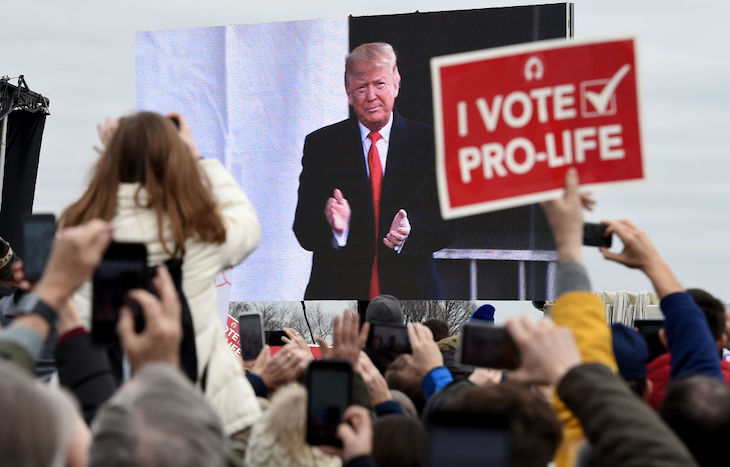The botched assassination attempt on Donald Trump could well generate a wave of sympathy that helps waft him into the White House in November. Another indirect result of those same events may contribute further to this effect. Until the Republican National Convention opened in Milwaukee this week, the GOP had a potentially awkward problem over its stance on abortion rights. Following the attempt on Trump’s life, this has now disappeared.
The abandonment of the old hard-line position removes an intellectual difficulty for the Republicans
Since the right-leaning Supreme Court a couple of years ago overturned Roe v Wade, suppressed the judge-made constitutional right to abortion that had existed since 1973 and told state legislatures that matters now lay entirely in their hands, the party has been split. Many Republicans, probably the majority, were happy to say ‘Job done’ and turn to other things. Following hints from Trump, this live-and-let-live line was taken up by the committee of something over 100 people that draws up the party’s official platform.
‘After 51 years, because of us, that power has been given to the States and to a vote of the People,’ it said in its draft last week, before adding, in a nod to principled pro-lifers, ‘We will oppose Late Term Abortion, while supporting mothers and policies that advance Prenatal Care, access to Birth Control, and IVF.’
A vocal minority on the committee thought otherwise. They wanted the pro-life position bolstered with a call for federal legislative prohibition on abortion, at least after 20 weeks, and also with backing for a Human Life Amendment to the Constitution stating that life began at conception, matters that had previously featured in the party’s manifesto. An ugly and embarrassing floor debate loomed.
However, following the Trump shooting on Saturday the minority opted for conciliation. Its report has been quietly sidelined, and the anodyne draft remains. Admittedly the issue remains, and there is a threat to resurrect it: but during the election the dispute has gone away.
To pro-lifers this might look like selling the pass. It is nevertheless good news for Trump and the Republicans. It is also the right decision, whether you are pro-life or pro-choice.
First and foremost, it is likely to increase Trump’s support, and the Republican vote generally, in an election where abortion remains a very hot-button issue.
Everyone knows Trump to be pro-life personally, despite his earlier flirtation with a pro-choice platform, and his running-mate JD Vance to be even more so. (The latter has come out as opposing abortion even in cases of rape, although he does grudgingly concede the point where the life of the mother is at stake.) But many potential Republican voters, especially in swing states, the rust-belt and places that have not done well under Biden, will be less sure; some might even quietly sympathise with limited abortion rights. They will find it much easier to back a party that leaves at least some wiggle-room. And even those with stronger pro-life views will be painfully aware that, however much they dislike the GOP position, many Democratic candidates have views they dislike more.
The abandonment of the old hard-line position also removes an intellectual difficulty for the Republicans. Many conservatives supported the reversal of Roe v Wade on a simple argument of states’ rights: why should Washington decide on the issue of abortion rather than the 50 state legislatures? But if the Republicans were now to propose federal anti-abortion legislation that would apply nationwide and pre-empt state laws, what price then those same states’ rights? Republican candidates, one suspects, would have been tying themselves in intellectual knots for years to come.
And, in any case, the decision is right. It is correct as a matter both of democracy and of constitutional balance. One difficulty with Roe v Wade was that it mightily over-extended the powers of the federal government and judiciary. Nowhere does anything remotely like a right to abortion appear in the Constitution: the best that the Supreme Court could come up with in 1973 was the thoroughly tendentious argument that the Fourteenth Amendment prohibiting any state from taking life liberty or property without due process had to encompass a right to privacy, and that the right to privacy in turn had to include a right in at least some cases to abortion. It is not difficult to see the difficulties here.
If you believe in democracy, on a matter of social policy as polarising as abortion there is every reason to allow a different result to be reached in, say, conservative Mississippi and, say, ultra-liberal Michigan (the latter of which, indeed, within months of the reversal of Roe v Wade inserted an express right to abortion in its state constitution, as it had every right to do). A return to allowing the federal government to dictate abortion policy, albeit legislatively rather than judicially, would upset this careful balance.
Trump can well do without polarising issues that distract from his message this November. The events of this week have, it seems clear, done him an enormous favour in removing one of these from the equation. He can now wait, hope, and campaign with a slightly lighter heart.







Comments